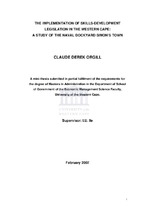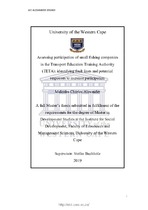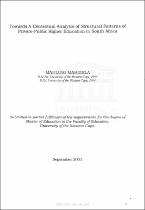| dc.contributor.advisor | Bird, Adrienne | |
| dc.contributor.author | Kraak, Andre | |
| dc.date.accessioned | 2021-10-28T11:01:37Z | |
| dc.date.available | 2021-10-28T11:01:37Z | |
| dc.date.issued | 1994 | |
| dc.identifier.uri | http://hdl.handle.net/11394/8542 | |
| dc.description | Philosophiae Doctor - PhD | en_US |
| dc.description.abstract | This thesis is a comparative study of competing education and training (ET) policy options in South Africa today. The thesis examines the economic and ET policy proposals of the South African state, and in particular, the recently published National Training Strategy and Education Renewal Strategy. These documents are both critically examined and contrasted with the policy proposals which are currently emerging in the African National Congress (ANC) and Congress of South African Trade Unions (Cosatu). The analysis establishes a continuum of ET systems, with the policy proposals of the South African state representing a <low-skill equilibrium' system and the Framework for Lifelong Learning document of the ANC/ Cosatu reflecting a more highskill equilibrium' orientation. A <macro-institutional' theoretical perspective is employed throughout the thesis, an approach which combines a focus on the e macro' structural features of capitalist society with an analysis of the vast nexus of interlocking social institutions existing at the sub-structural level. This macro-institutional approach is particularly evident in the manner in which two key theoretical themes have been foregrounded throughout the text. The first has to do with the central macro' question of the market/state relation and its relevance for ET. The second has to do with the e institutional' dynamic of" the interaction between the ET system, the labour market and the organisation of work and the manner in which this interaction mediates the impact of ET on society and economic performance. The strength of the <macro-institutional' perspective is that it emphasises that the reform of ET in isolation of other societal changes is insufficient in the pursuit of higher productivity and improved economic performance. What is essential is comprehensive reform: reforms which impact on a whole range of key institutional locations. This requires coherent and long-term planning, a form of governance most often obtained by consensual co-ordinated market economies and seldom under free market
conditions. The conclusion to this thesis suggests that the ANC/ Cosatu economic and ET proposals are more likely to obtain comprehensive reform' of the South African social structure than those proposals emanating from the current state. | en_US |
| dc.language.iso | en | en_US |
| dc.publisher | University of the Western Cape | en_US |
| dc.subject | Post-secondary education and training (PSET) | en_US |
| dc.subject | Edukon | en_US |
| dc.subject | Balkanisation | en_US |
| dc.subject | Competency-based modular education and training (CBMET) | en_US |
| dc.subject | African National Congress (ANC) | en_US |
| dc.subject | Education and training (ET) | en_US |
| dc.subject | National Training Strategy and Education Renewal Strategy. ( NTSERS) | en_US |
| dc.subject | Cosatu | en_US |
| dc.title | Free or co-ordinated markets? education and training policy options for a future South Africa | en_US |
| dc.rights.holder | University of the Western Cape | en_US |




